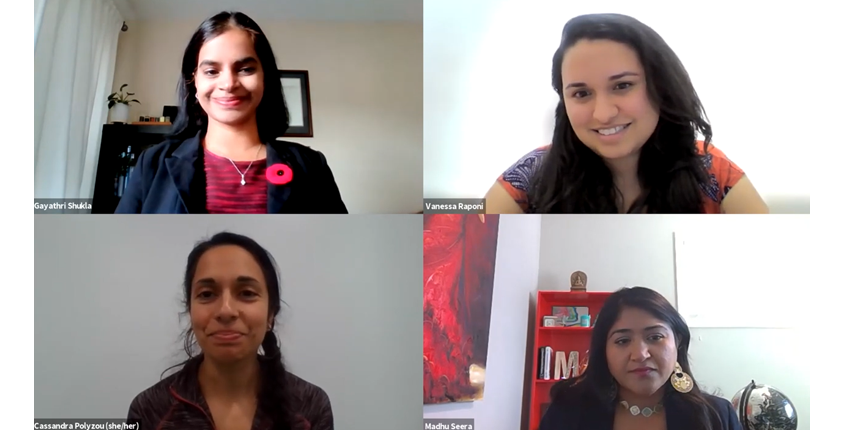

Every second Wednesday of the month, DiscoverE’s Persist Series hosts a session where women in engineering and technology candidly share their personal stories, discuss how to navigate workplace challenges, and debate tactics to help them stay and advance in the field.
The last session of the year—From Mindset to Management: Transforming from the Inside Out—took place on November 10 and dove into how both employees and organizations can leverage their own stories to make necessary changes that reflect their core values in lasting sustainable ways.
The session was hosted by Persist Series host Andronica Klaas, and began with a conversation with Gayathri Shukla, P.Eng., an engineer and entrepreneur in Alberta and founder of Campfire Kinship. The session then featured a live Q&A moderated by Vanessa Raponi, EIT, Founder of EngiQueers Canada, and featuring Shukla, Madhu Seera, P.Eng., Manager of Transportation Strategy at the City of Calgary, and Cassandra Polyzou, Engineers Canada’s Manager of Equity, Diversity, and Inclusion.
The panellists each shared their thoughts on creating change and what mindsets and practices they have found to be most helpful in working through change, especially when it comes to creating greater equity, diversity, and inclusion in traditionally male-dominated engineering workplaces. Below, Engineers Canada’s Polyzou recaps the thoughts she shared on the panel.
Engineers Canada: A theme that came up frequently during the panel—and throughout the Persist Series episodes—was creating change to make engineering and technology spaces more equitable, diverse, and inclusive. What are some of the biggest challenges to creating change and what helps you overcome those challenges?
Cassandra Polyzou: I think one of the biggest challenges to enacting change is one’s own mindset. Generally, we have a set thinking of how our life is going to go. We’re asked at a very young age, ‘what are you going to be, what are you going to do when you grow up?’ and we see our lives in a very linear format. Anything that presents a challenge to that linear thinking—like change—we see as an uncomfortable challenge, or something messy that we need to compartmentalize and clean up.
One of my favourite places to go and where I’m happiest is in nature, and I think about the intricacy and complexity of most natural systems. There, change is constantly happening. Whether it’s through the seasons or the life, death, and regeneration cycle, nothing is ever staying the same in nature. If we adopt that mindset and take our cue from nature, we can realize that change is OK. When I look at things through a social justice lens, and we’re trying to create social change, we have to recognize that change is healthy and can result in a better future.
EC: In Gayathri Shukla’s conversation that started off this Persist Series episode, she talked about being your authentic self, and using stories to create a culture of belonging and more inclusive spaces. What’s the importance of storytelling in the equity, diversity, and inclusion (EDI) sphere?
CP: I love the idea of storytelling. Everything that Gayathri Shukla is doing around storytelling and encouraging people to be their authentic selves is great. Nurturing that from the inside out is so important when we’re trying to transform the world around us. In particular, talking about failure and the mistakes that we’ve made—though hard and often vulnerable—is the valuable part of storytelling. When we’re trying to create spaces where we all feel we can be our authentic selves, it boils down to creating trust, and creating a space where we trust others with our authentic self. If we can trust other people with some of our more challenging stories, then we can really blossom at work or in whatever environment we’re in. Often when we’re talking about EDI topics and trying to get leaders to be more inclusive, it’s hard to get them to adjust to that change. But talking about personal stories, empathy, humility is really the way to go in this area. Storytelling is a way to humanize these things.
EC: The live Q&A generated a lot of great discussion and questions from the audience. What advice did you have for the audience, and for women in engineering and technology in general?
CP: There were a few pieces of advice that came up during the Q&A. One of them is to find allies in spaces. As a mixed-race individual, I can speak to the importance of finding folks that you can see yourself reflected in and gaining their trust and finding spaces where you can feel safe to be open and vulnerable.
Another piece of advice that I offered was seeking out these allies even outside of your colleagues, or HR in your immediate workplace. There are many groups that you can turn to, such as the Society of Women Engineers, or many of the engineering regulators here in Canada have women in engineering networking opportunities. Looking for people you can share your experiences with can be helpful, because even just getting it off your chest and seeing somebody else who has a similar experience who can give you some advice can help.
And finally, be true to yourself, and know that women belong in this space. They’ve worked so hard and all the achievement is showing that and workplaces are changing. But at the same time, know that it’s OK to be frustrated, it’s OK to feel angry sometimes. Don’t feel like you have to push it down to show a happy face. Feeling your full emotions and authenticity is about those ups and downs and that’s OK.
Find a recording of the full discussion, and other Persist Series episodes, on the DiscoverE website.


